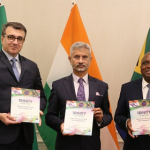It’s been a while since the India, Brazil and South Africa (IBSA) Forum[1] has been visible and active. For the last decade, it has lived in the shadow of the BRICS (Brazil, Russia, India, China, South Africa) grouping of which all three IBSA countries are also members.
This can now change. The years 2023-25 should put the IBSA partnership for South- South Cooperation at global centerstage. The consecutive Presidencies of the G20 for India, Brazil and South Africa provides a rare, unique opportunity to forge an agenda common to both the G20 and IBSA. The timing is coincident: with Russia and China consumed by conflict and zero-Covid respectively, BRICS has receded.
This offers IBSA the chance to convert both the Covid and Ukraine crises into an opportunity and become relevant to the Global South’s current and future challenges. In the new global context, the partnership can update its 2003 founding goals and agenda, aligning it with some of the G20s development priorities. These should include building equitable healthcare systems, a clean energy transition from fossil fuels and reducing global food insecurity
Two of the three countries have already seen recent joint traction on a critical healthcare related issue. India and South Africa’s joint advocacy for TRIPS flexibilities in the trade and Covid and broader health context, has already provided some global benefits but the TRIPS patent waiver can be extended to cover therapeutics and diagnostics. If candidate Lula wins the Presidency in Brazil later this month, Brazil will no doubt be willing to join, making IBSA a powerful alliance at the WTO.
All three countries have something unique to offer each other, to the G20 and to the Global South. India has IT and pharma dominance. Brazil leads in agriculture, and South Africa has a unique role and access to the African Union which should remain IBSAs highest priority for South-South Cooperation since most of the world’s poorest and most vulnerable countries are its members.
If an IBSA resurgence is to be appropriately exploited and its full potential realized, India will need to lead the way. One, it will be the first among IBSA to assume the G20 Presidency in December 2022 and, of the three, it has the most to offer the Global South on a post-Covid agenda of equitable healthcare as well as solar energy and digital information technology.
Of these, in today’s continuing Covid-19 and tomorrow’s post-Covid world, India’s global leadership and IBSA’s potential contribution to healthcare has the most urgent relevance. Despite its many public healthcare infrastructure shortcomings, India leads in at least three critical healthcare-related areas: low-cost vaccine technology, effective health immunization delivery at scale and low-cost generic pharmaceutical manufacturing. All three were in evidence and continue to be crucial to the global response to the Covid-19 crisis. In particular, the UN-led Covax Facility is able to provide large amounts of free vaccine to Africa and developing regions largely because of the Serum Institute of India’s Covishield.[2] India provided early vaccines to Brazil when the unreasonable terms of the western pharma giants to provide vaccines, were rejected by Brasilia. And India can significantly contribute to traditional medicines – an area of joint interest highlighted at a Sept 21 meeting of IBSA foreign ministers held on the sidelines of the UN General Assembly in New York. [3]
India’s health immunisation experience (eg. polio eradication), vaccines and generic pharmaceutical products have been shared for decades bilaterally and by WHO and IBSA.
Leveraging India’s digital and IT expertise can help the sector with renewed, more systematic, continuous and scaled-up efforts. India should not just export medicines but establish joint manufacturing facilities with appropriate local companies or the government in these countries and regions, sharing the thinking, technology, government enabling policies, innovations, processes and systems behind its success which can be replicated in other Global South countries.
IBSA can be the catalyst for bringing together private companies like Cipla and the Serum Institute with Bharat Biotech and other government and non-government stakeholders in India and their counterparts first within the partnership and then in the developing world. Relevant UN agencies, especially UNDP and WHO, long-standing trusted partners of IBSA [4]have supported and documented much of India’s experience. They can assist in facilitating this critical task as neutral parties. Brazil’s strength and priority is agriculture, and it can lead in addressing the challenge of global food insecurity, an unfortunate consequence of the Ukraine war. IBSA should also collectively work more tangibly on clean energy security and environment and climate change issues which it has already prioritized. India has global leadership on solar energy while South Africa has some good examples of environmental conservation.
To ensure an IBSA-hued G20, the partnership must start work on a common three-year agenda before and at the November 6th IBSA Summit chaired by India, timed to be held on the sidelines of the G20 Summit in Indonesia, dovetailing it carefully with the G20’s development working group agenda for the same period. This must be translated into tangible offerings backed by a substantial financing package for the Global South primarily through the IBSA Fund which is managed by the UNs Special Unit for South- South Cooperation located within UNDP.
Kamal Malhotra is a Non-Resident Senior Research Fellow for Global Economic Governance Initiative at the US-based Boston University Global Development Policy Center
This article was exclusively written for Gateway House: Indian Council on Global Relations. You can read more exclusive content here
For permission to republish, please contact outreach@gatewayhouse.in
©Copyright 2022 Gateway House: Indian Council on Global Relations. All rights reserved. Any unauthorised copying or reproduction is strictly prohibited.
[1] https://www.ibsa-trilateral.org
[2] https://www.who.int/news/item/15-02-2021-who-lists-two-additional-covid-19-vaccines-for-emergency-use-and-covax-roll-out
[3] https://www.mea.gov.in/bilateral-documents.htm?dtl/35736/Joint_Communique_following_the_10th_IBSA_Trilateral_Ministerial_Commission_Meeting.
[4]https://info.undp.org/docs/pdc/Documents/BRB/.IBSA%20Fund%20%20Programme%20Guidelines%20%20Revision%208%20-%20final.pdf


